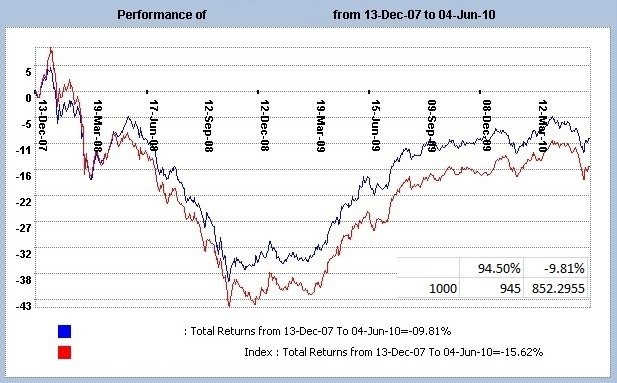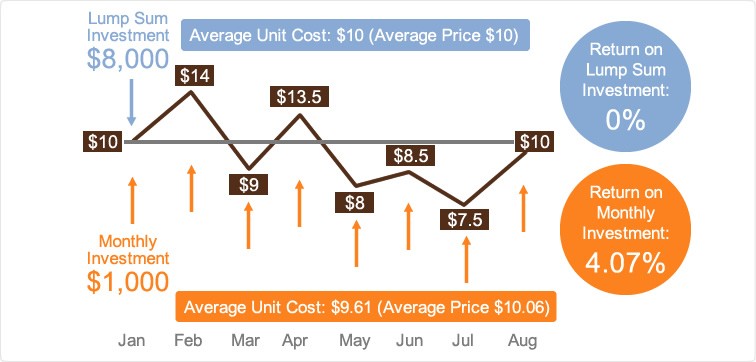Lump Sum Investing v Cost Averaging
Post on: 13 Август, 2015 No Comment

I ran across an interesting discussion on the Bogleheads Investment Forum. It centered on the issue of lump sum investing vs. dollar cost averaging.
With lump sum investing, you take whatever you have on hand to invest and you put it in the market all at once in your desired asset allocation. With DCA, you invest it in chunks over a period of time. As the market rises, you get fewer shares. As it falls, you get more.
In general terms, DCA is a risk avoidance strategy. Viewed in a vacuum, this might be good. On average, however, it also reduces your expected returns. The reason for this is that, historically, the market has trended upward.
By holding money in cash, youre missing out on a portion of this expected return. Of course, the market is anything but a smooth ride, so by holding a portion of you money on the sidelines you avoid the risk of buying in before a major downturn.
Okay, lets just stop and think for a moment Lets say you have a target allocation of 60% stocks and 40% bonds on you inherit a million dollars in cash.
Assuming that your target allocation remains the same and that you ultimately want all of it invested, would you immediately buy $600k in stocks and $400k in bonds? Or would you sit on the cash and deploy it a little at a time say $50k per month for the next 20 months?
Id bet that a fair number of you would opt for the latter. Put the money in the market a little at a time to avoid a calamity. But is that really the wise thing to do?
A commenter named Don offered up this hypothetical scenario:
Lets say you inherit a large portfolio, and by the grace of the gods, on the day you inherit it, it happens to match your preferred asset allocation perfectly.
Would you:
1) immediately liquidate to cash and start dollar cost averaging back to your asset allocation.
2) sleep well knowing that you have a well diversified portfolio appropriate to your risk tolerance and goals.
I would wager that almost everyone would choose 2.
I would tend to agree with Dons assessment that most people would choose option #2 and leave well enough alone.

But why?
Ignoring possible tax implications (which is fair because of the stepped-up basis associated with an inheritance), option #1 is the equivalent of receiving a cash windfall and dollar cost averaging which I suspect many people would do. In contrast, option #2 is the equivalent to receiving a cash windfall and immediately dumping it in the market.
Perhaps Im wrong about what most people would do, but I have to admit that Id be inclined to DCA a large cash windfall, whereas Id leave well enough alone if I inherited a portfolio that matched my desired allocation. Does this make sense? Not really, but thats what my gut would tell me to do. Which leads back to the above question Why?
I guess its because a loss following a conscious decision to make a lump sum investment would sting more than an equivalent loss that resulted from inaction (i.e. allowing an inherited portfolio to take a nosedive). Yes, I realize that Im ultimately making the decision in both cases, but in one case Im taking action, and in the other case Im not.
Irrational? Absolutely. Which is why its important to take a step back and analyze situations like this. As a wise man once said, money is more about the mind than the math .
As an aside, if you are deathly afraid of the loss that you might incur when making a lump sum investment, you might want to reconsider your risk tolerance. Perhaps this is a sign that your investments are too aggressive and that you should shift toward a more conservative allocation.
Published on August 31st, 2011
Modified on September 5th, 2011 - 24 Comments














